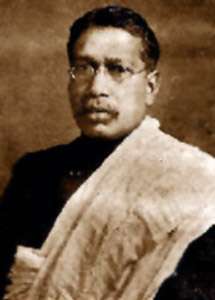Bipin Chandra Pal
| Bipin Chandra Pal | |
|---|---|
 | |
| Born |
November 7, 1858 Habiganj, Sylhet region, British India (now Bangladesh) |
| Died | May 20, 1932 (aged 73) |
| Organization | Indian National Congress, Brahmo Samaj |
| Movement | Indian Independence movement |
| Signature | |
|
| |
Bipin Chandra Pal ![]() pronunciation ; November 7, 1858 – May 20, 1932) was an Indian nationalist. He was among the triumvirate of Lal Bal Pal which consisted of Lala Lajpat Rai, Bal Gangadhar Tilak( Lokmanya Tilak) and Bipin Chandra Pal, himself.
pronunciation ; November 7, 1858 – May 20, 1932) was an Indian nationalist. He was among the triumvirate of Lal Bal Pal which consisted of Lala Lajpat Rai, Bal Gangadhar Tilak( Lokmanya Tilak) and Bipin Chandra Pal, himself.
Early life and background
Bipin Chandra Pal was born in Poil Village, Habiganj District, Bengal state of British India (now part of Bangladesh), in a wealthy Hindu Vaishnava family. His father was Ramchandra Pal, a Persian scholar and small landowner. His son was Niranjan Pal, one of the founders of Bombay Talkies. He studied and taught at the Church Mission Society College (now the St. Paul's Cathedral Mission College), an affiliated college of the University of Calcutta.[1] B.C. Pal is known as the 'Father of Revolutionary Thoughts' in India and was one of the freedom fighters of India.[2] He is also known as Bengal tiger
Role in congress
- In 1886 he joined the Indian National Congress. At the Madras session of congress held in 1887,Bipin Chandra made a strong plea for repeal of the Arms Act which was discriminatory in nature.
- Along with Lala Lajpat Rai and Bal Gangadhar Tilak he belonged to the Lal,Bal and Pal trio that was associated with revolutionary activity. In fact Aurobindo Ghosh and Pal were recognised as the chief exponents of a new national movement revolving around the ideals of Purna Swaraj, Swadeshi, boycott and national education.
- His program consisted of Swadeshi, Boycott and national education. He preached the use of Swadeshi and the Boycott of foreign goods to eradicate poverty and unemployment.
- He wanted to remove social evils from the form and arouse the feelings of nationalism through national criticism.
- He had no faith in mild protests in the form of Non-Cooperation with the government. On that one issue, the Assertive nationalist leader had nothing common with Gandhi.
- During last six years of his life he parted company with the Congress and led a secluded life. Sri Aurobindo referred to him as one of mightiest prophets of nationalism.
References
- ↑ List of distinguished alumni Archived 25 September 2012 at the Wayback Machine.
- ↑ "Bipin Chandra Pal".
- Owen, N (2007), The British Left and India, Oxford University Press, ISBN 0-19-923301-2.
Further reading
- Lenman, Bruce; Marsden, Hilary, eds. (2005). Chambers Dictionary of World History. London: Chambers Harrap. ISBN 978-0-550-10094-8 – via Credo Reference.